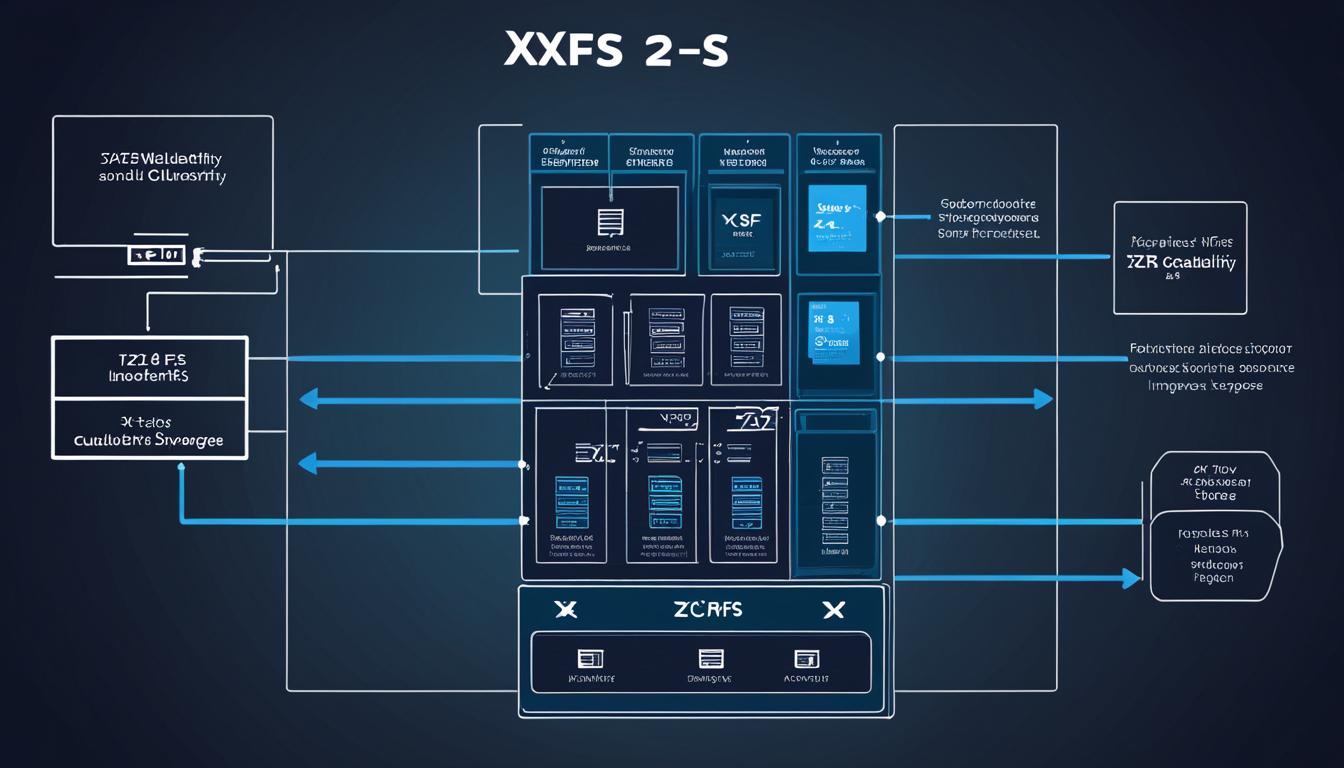XFS vs ZFS: Unveiling the Best File System Choices
Greetings! Today, I’m going to delve into the world of file systems and compare two widely used options: XFS and ZFS. If you’re unfamiliar with these terms, don’t worry—I’ll provide a comprehensive comparison to help you make an informed decision for your file system needs.
As we explore XFS and ZFS, we’ll analyze their performance, data integrity, scalability, and flexibility. By the end, you’ll have a clear understanding of the strengths and weaknesses of each file system and which one might be the best fit for you.
Key Takeaways:
- XFS and ZFS are popular file systems with distinct features and advantages
- Performance varies, with XFS excelling in small file handling and efficient disk space management
- ZFS boasts unmatched data integrity and protection features
- Both file systems offer scalability, but with different levels of flexibility
- The choice between XFS and ZFS ultimately depends on your specific needs and priorities
Performance Comparison of XFS and ZFS
When it comes to performance, both XFS and ZFS have their strengths. XFS is known for its high performance in handling small files and efficient disk space management. It supports large file sizes and has improved allocation and filesystem check capabilities. On the other hand, ZFS offers scalability, robust snapshot and mirror capabilities, and automatic data reconstruction in case of errors. It also supports data compression and deduplication.
“XFS provides excellent performance in handling small files and efficient disk space management.”
“ZFS offers scalability, robust snapshot and mirror capabilities, and automatic data reconstruction in case of errors.”
Both file systems have their advantages, making it important to consider your specific needs before choosing one. Let’s take a closer look:
Performance comparison:
| Features | XFS | ZFS |
|---|---|---|
| Handling small files | High performance | N/A |
| Disk space management | Efficient | N/A |
| Support for large file sizes | Yes | N/A |
| Allocation capabilities | Improved | N/A |
| Filesystem check capabilities | Yes | N/A |
| Scalability | N/A | Yes |
| Snapshot capabilities | N/A | Robust |
| Mirror capabilities | N/A | Robust |
| Automatic data reconstruction | N/A | Yes |
| Data compression support | N/A | Yes |
| Deduplication support | N/A | Yes |
As shown in the comparison table, XFS excels in handling small files, efficient disk space management, support for large file sizes, improved allocation and filesystem check capabilities. On the other hand, ZFS offers scalability, robust snapshot and mirror capabilities, automatic data reconstruction, and support for data compression and deduplication.
Considering these factors, it’s important to evaluate your specific requirements to determine which file system will best meet your performance needs.
Data Integrity and Protection in XFS and ZFS
When it comes to ensuring data integrity and protection, ZFS emerges as the superior choice between XFS and ZFS file systems. ZFS incorporates built-in checksumming of all data and metadata, which not only detects but also corrects errors in the system. This robust checksum mechanism enhances data reliability and reduces the risk of data corruption or loss. Additionally, ZFS supports advanced features like mirroring and multiple-parity RAID, providing redundancy and fault tolerance to safeguard against hardware failures and ensure data availability even in adverse situations.
In contrast, XFS lacks the comprehensive data protection capabilities offered by ZFS. While XFS does provide a level of reliability, its data integrity features may not be as robust as those found in ZFS. Without built-in checksumming and advanced redundancy options, XFS users may be more vulnerable to data corruption or loss, especially when dealing with large volumes of critical data.
To summarize, ZFS’s superior data integrity mechanisms, including checksumming, mirroring, and multiple-parity RAID, ensure better protection against errors, hardware failures, and data corruption. This makes ZFS the preferred choice for users seeking enhanced data integrity and protection in their file systems.

| File System | Data Integrity Features | Redundancy Options |
|---|---|---|
| XFS | Reliability, but lacks comprehensive data protection features | Limited redundancy options |
| ZFS | Built-in checksumming of data and metadata | Mirroring, multiple-parity RAID |
Scalability and Flexibility Compared: XFS vs ZFS
Both XFS and ZFS offer impressive scalability, but they differ in terms of flexibility. XFS, supported by Red Hat Enterprise Linux, boasts exceptional scalability when it comes to handling large filesystems. It has the capability to manage massive amounts of data and accommodate numerous subdirectories within a single directory.
However, XFS has limitations when it comes to flexibility. For instance, it lacks the ability to expand or shrink a storage pool and change the data protection type without rebuilding the entire pool. This can be a drawback in situations where dynamic adjustments and modifications to the storage pool are needed.
On the other hand, ZFS, while having more limitations in terms of scalability, offers greater flexibility in terms of expanding storage pools and changing data protection settings. With ZFS, you can easily expand or shrink storage pools to accommodate changing storage requirements. Additionally, you can adjust the data protection settings without rebuilding the entire pool, providing more flexibility in managing and optimizing your storage environment.
When it comes to scalability and flexibility, choosing between XFS and ZFS involves striking the right balance based on your specific needs. While XFS excels in handling large filesystems, ZFS offers more adaptability when it comes to managing and modifying storage configurations.
Scalability and Flexibility Comparison
| Features | XFS | ZFS |
|---|---|---|
| Scalability | High scalability for large filesystems | Limitations in scalability, but allows for storage pool expansion |
| Flexibility | Lacks flexibility in expanding and modifying storage pools | Offers greater flexibility in expanding and modifying storage pools |
Conclusion
After a comprehensive comparison between XFS and ZFS, it is evident that both file systems have their own set of strengths and weaknesses. XFS is highly regarded for its exceptional performance and scalability, making it an ideal choice for managing large filesystems. On the other hand, when it comes to data integrity and protection, ZFS stands out with its extensive collection of features, including checksumming, automatic data reconstruction, and redundancy options.
One area where ZFS surpasses XFS is in terms of flexibility. ZFS allows for easy expansion and modification of storage pools, providing users with greater control over their data. However, XFS lacks some of the flexibility of ZFS and may require rebuilding the pool when changing data protection or adjusting storage pool size.
In the end, the selection between XFS and ZFS should be based on your specific needs and priorities. Consider factors such as performance requirements, data integrity, scalability, and flexibility when making the decision. Before making a choice, thoroughly assess your use case and determine which features are essential for your file system.
FAQ
What is the difference between XFS and ZFS?
XFS and ZFS are different file systems with unique features and advantages. XFS is known for its high performance and efficient disk space management, while ZFS offers scalability, robust snapshot capabilities, and automatic data reconstruction.
Which file system has better performance, XFS or ZFS?
Both XFS and ZFS have their strengths when it comes to performance. XFS excels in handling small files and has improved allocation capabilities, while ZFS offers scalability and supports data compression and deduplication.
Which file system provides better data integrity and protection?
ZFS is widely regarded as the superior choice for data integrity and protection. It includes built-in checksumming of all data and metadata, supports mirroring and multiple-parity RAID, and offers automatic data reconstruction in case of errors. XFS, while reliable, may not be as robust in terms of data integrity.
How do XFS and ZFS differ in terms of scalability and flexibility?
XFS is known for its scalability in handling large filesystems and supports massive amounts of data. However, it lacks flexibility in expanding or shrinking a storage pool and changing data protection settings without rebuilding the pool. ZFS, on the other hand, allows for easier expansion and modification of storage pools but has more limitations in terms of scalability.
Which file system should I choose, XFS or ZFS?
The choice between XFS and ZFS depends on your specific needs and priorities. If you require high performance and scalability for handling large filesystems, XFS may be the better choice. However, if data integrity and protection are paramount, ZFS stands out with its comprehensive features. Consider factors such as performance requirements, data integrity, scalability, and flexibility when making your decision.
- About the Author
- Latest Posts
Mark is a senior content editor at Text-Center.com and has more than 20 years of experience with linux and windows operating systems. He also writes for Biteno.com





